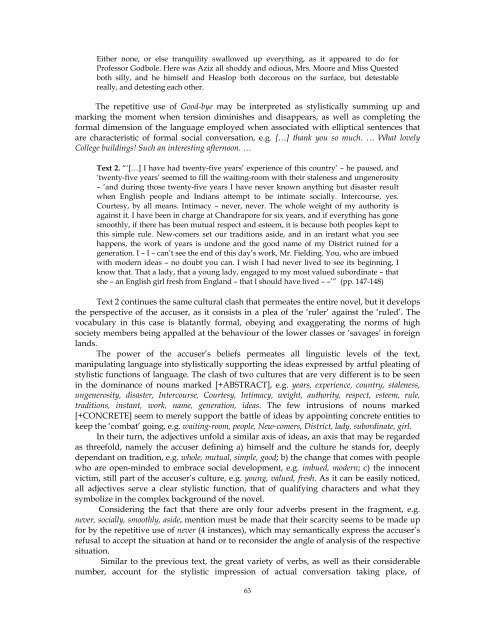You also want an ePaper? Increase the reach of your titles
YUMPU automatically turns print PDFs into web optimized ePapers that Google loves.
Either none, or else tranquility swallowed up everything, as it appeared to do for<br />
Professor Godbole. Here was Aziz all shoddy and odious, Mrs. Moore and Miss Quested<br />
both silly, and he himself and Heaslop both <strong>de</strong>corous on the surface, but <strong>de</strong>testable<br />
really, and <strong>de</strong>testing each other.<br />
The repetitive use of Good-bye may be interpreted as stylistically summing up and<br />
marking the moment when tension diminishes and disappears, as well as completing the<br />
formal dimension of the language employed when associated with elliptical sentences that<br />
are characteristic of formal social conversation, e.g. […] thank you so much. … What lovely<br />
College buildings! Such an interesting afternoon. …<br />
Text 2. “‘[…] I have had twenty-five years’ experience of this country’ – he paused, and<br />
‘twenty-five years’ seemed to fill the waiting-room with their staleness and ungenerosity<br />
– ‘and during those twenty-five years I have never known anything but disaster result<br />
when English people and Indians attempt to be intimate socially. Intercourse, yes.<br />
Courtesy, by all means. Intimacy – never, never. The whole weight of my authority is<br />
against it. I have been in charge at Chandrapore for six years, and if everything has gone<br />
smoothly, if there has been mutual respect and esteem, it is because both peoples kept to<br />
this simple rule. New-comers set our traditions asi<strong>de</strong>, and in an instant what you see<br />
happens, the work of years is undone and the good name of my District ruined for a<br />
generation. I – I – can’t see the end of this day’s work, Mr. Fielding. You, who are imbued<br />
with mo<strong>de</strong>rn i<strong>de</strong>as – no doubt you can. I wish I had never lived to see its beginning, I<br />
know that. That a lady, that a young lady, engaged to my most valued subordinate – that<br />
she – an English girl fresh from England – that I should have lived – –’” (pp. 147-148)<br />
Text 2 continues the same cultural clash that permeates the entire novel, but it <strong>de</strong>velops<br />
the perspective of the accuser, as it consists in a plea of the ‘ruler’ against the ‘ruled’. The<br />
vocabulary in this case is blatantly formal, obeying and exaggerating the norms of high<br />
society members being appalled at the behaviour of the lower classes or ‘savages’ in foreign<br />
lands.<br />
The power of the accuser’s beliefs permeates all linguistic levels of the <strong>text</strong>,<br />
manipulating language into stylistically supporting the i<strong>de</strong>as expressed by artful pleating of<br />
stylistic functions of language. The clash of two cultures that are very different is to be seen<br />
in the dominance of nouns marked [+ABSTRACT], e.g. years, experience, country, staleness,<br />
ungenerosity, disaster, Intercourse, Courtesy, Intimacy, weight, authority, respect, esteem, rule,<br />
traditions, instant, work, name, generation, i<strong>de</strong>as. The few intrusions of nouns marked<br />
[+CONCRETE] seem to merely support the battle of i<strong>de</strong>as by appointing concrete entities to<br />
keep the ‘combat’ going, e.g. waiting-room, people, New-comers, District, lady, subordinate, girl.<br />
In their turn, the adjectives unfold a similar axis of i<strong>de</strong>as, an axis that may be regar<strong>de</strong>d<br />
as threefold, namely the accuser <strong>de</strong>fining a) himself and the culture he stands for, <strong>de</strong>eply<br />
<strong>de</strong>pendant on tradition, e.g. whole, mutual, simple, good; b) the change that comes with people<br />
who are open-min<strong>de</strong>d to embrace social <strong>de</strong>velopment, e.g. imbued, mo<strong>de</strong>rn; c) the innocent<br />
victim, still part of the accuser’s culture, e.g. young, valued, fresh. As it can be easily noticed,<br />
all adjectives serve a clear stylistic function, that of qualifying characters and what they<br />
symbolize in the complex background of the novel.<br />
Consi<strong>de</strong>ring the fact that there are only four adverbs present in the fragment, e.g.<br />
never, socially, smoothly, asi<strong>de</strong>, mention must be ma<strong>de</strong> that their scarcity seems to be ma<strong>de</strong> up<br />
for by the repetitive use of never (4 instances), which may semantically express the accuser’s<br />
refusal to accept the situation at hand or to reconsi<strong>de</strong>r the angle of analysis of the respective<br />
situation.<br />
Similar to the previous <strong>text</strong>, the great variety of verbs, as well as their consi<strong>de</strong>rable<br />
number, account for the stylistic impression of actual conversation taking place, of<br />
63












